How To Submit Your Next Article On Foojay.io
- May 03, 2022
- 13378 Unique Views
- 4 min read
Foojay, the place for friends of OpenJDK, is a friendly community of users of the OpenJDK, such as Java developers and Kotlin developers.
It is a collaborative community with tips and insights being shared on a daily basis on Foojay Today.
But how to get started and begin publishing your content? We use WordPress, which has several advantages, notably that everyone knows WordPress. (In a perfect world, we'd be using something different and Java-based and anyone with an alternative available in Java or who wants to work on that with us, speak up!)
However, the Foojay.io WordPress is not just any WordPress. It has been extended by the brave Foojay.io Development Team in Ukraine. (Read more about them here. Hire the Yelk Team. They're great.) Possibly the Foojay.io WordPress is the most developer-friendly WordPress you have ever encountered, including, for example, built-in support for Markdown and AsciiDoc.
Insights on Enterprise Java: Current Trends, Challenges and Strategies
Register now for Insights on Enterprise Java: Current Trends, Challenges and Strategies on crowdcast, scheduled to go live on February 11, 2026, 02:30 PM GMT!
Register Here!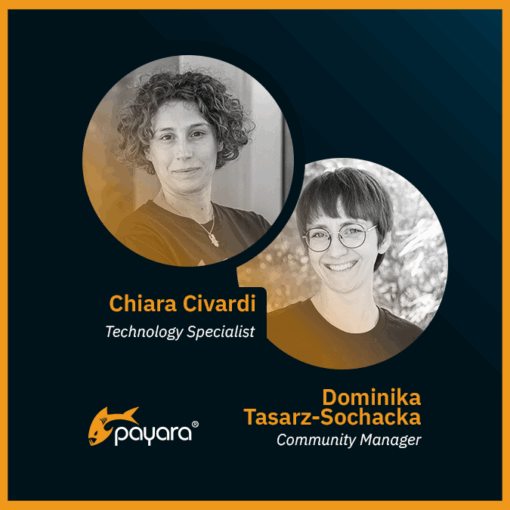
Here's the complete guide to publishing or republishing your content on the Foojay.io WordPress!
Writing a Post
- Get started by joining the Foojay community on Slack, go to the #random channel and say a bit about who you are how you'd like to collaborate with the friends of OpenJDK community (maybe you'd like to share content on foojay.io/today, maybe you'd like to just hang out and chat with other Java or Kotlin users, etc), then go to the #foojay-site-content channel and ask for your login credentials, if you'd like to blog/share content on foojay.io/today.
- Login to the WordPress: foojay.io/wp-admin.
- Create your post, as shown below, after clicking Posts in the navigation bar on the left or the menubar along the top.
- Write your article, click Save Draft. Once you have saved a draft, you can disable Markdown if you prefer the WordPress block editor.
- Make sure to check the preview of your article!
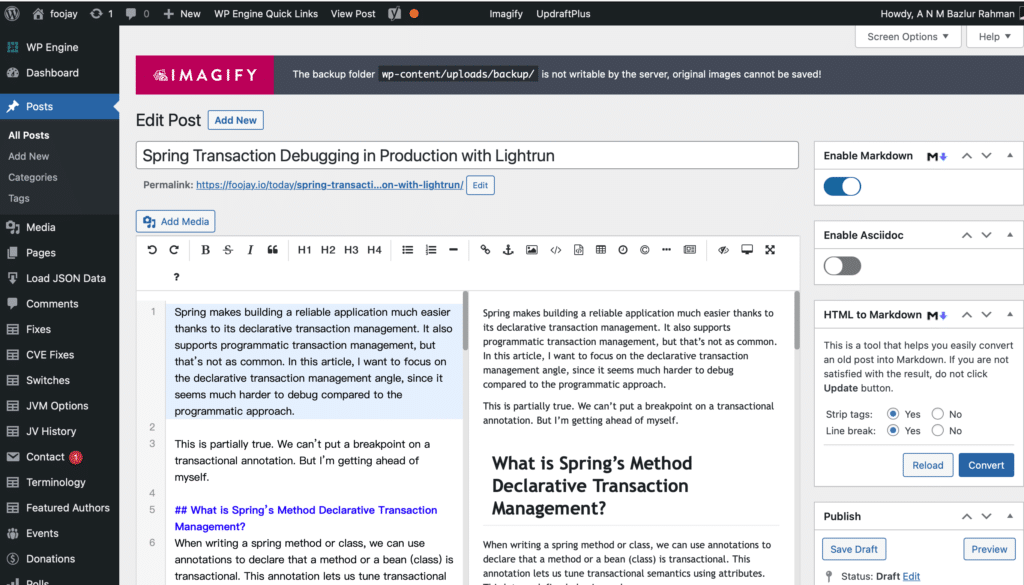
Publishing a Post
Once your post is ready, you have saved it as a draft, and checked the preview, you have these options:
- Keep it in draft: Go to the Foojay community on Slack > #foojay-site-content channel, and say "Hurray, I'm done, <your article> is ready to publish!" One of the editors working on Foojay.io will then follow-up, and if still needed, tweak a bit and schedule the article to be published.
- Schedule yourself: Check the homepage of Foojay.io for the list of scheduled posts. You can also find this info, when logged in, on the WordPress Dashboard. Find a date without scheduled posts, and use this to schedule your post yourself. Go to the Foojay community on Slack > #foojay-site-content channel, and say "I scheduled <your article> to be published on <date>."
- Publish immediately: If your post is urgent, e.g. release notes, an event that's happening, etc. you can also publish it as soon as you're finished. Go to the Foojay community on Slack > #foojay-site-content channel, and say "This was urgent, so I published <your article>."
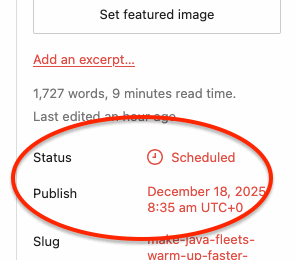
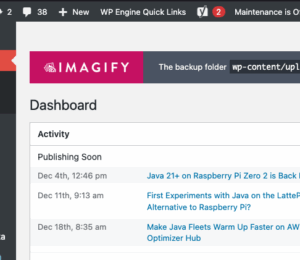
Tips and Tricks
Working with Code Blocks
Working with code blocks can be a bit painful if you don't know how they work, and you might be surprised by how they're initially rendered. Some tips:
- Disable Markdown and, optionally, Asciidoc, then review in WYSIWYG.
- Take note of the code snippets and whether they are rendered correctly.
- Top right above the article, you see "Save Draft", "Preview", and "Publish". Click "Preview" and then click "Preview in new tab'"
- Scroll down, look at the code, if it looks horrible (i.e., no syntax colors), go back to the article, to the place where the code is, copy the code from the preview, click "Code Insert" and select the Language from the drop-down (e.g., Java), paste in the code, click OK.
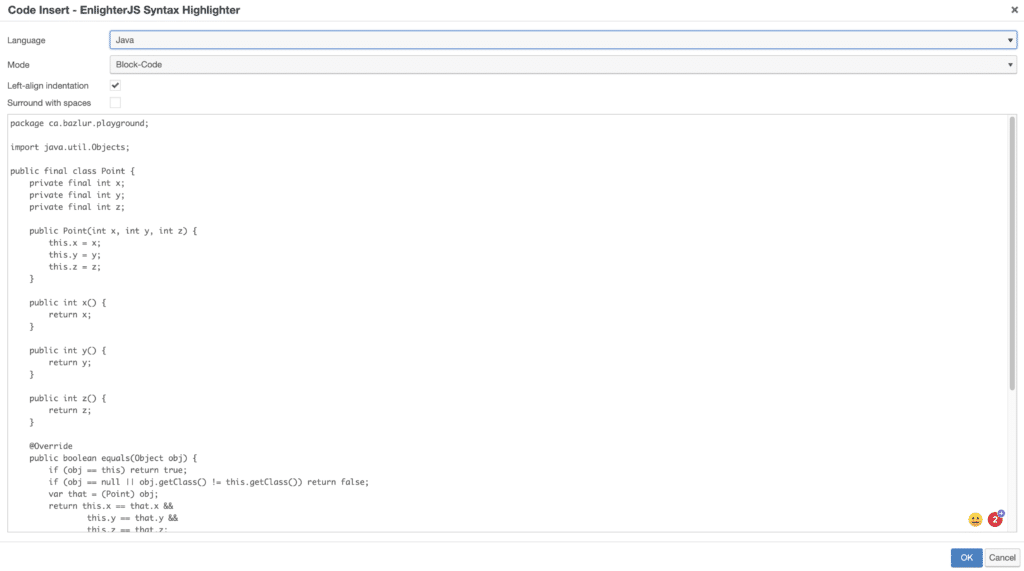
Writing Tip
Shorten your long paragraphs. Even one sentence per paragraph is better than multiple long sentences that form long, unscannable paragraphs. Browse the text to make sure everything is readable.
Related Posts
Add some Related Articles at the end of the article, this will help people to find more of your or related content:

Categories and Homepage
All content on Foojay is grouped into categories. This is shown on the homepage and other sections of the website. Also crucial for a post's preview box is a featured image. Both of these can be defined on the right-hand side bar, in the Post tab:
- Pick a few categories.
- Add a featured image, which is nice to have, though not mandatory.
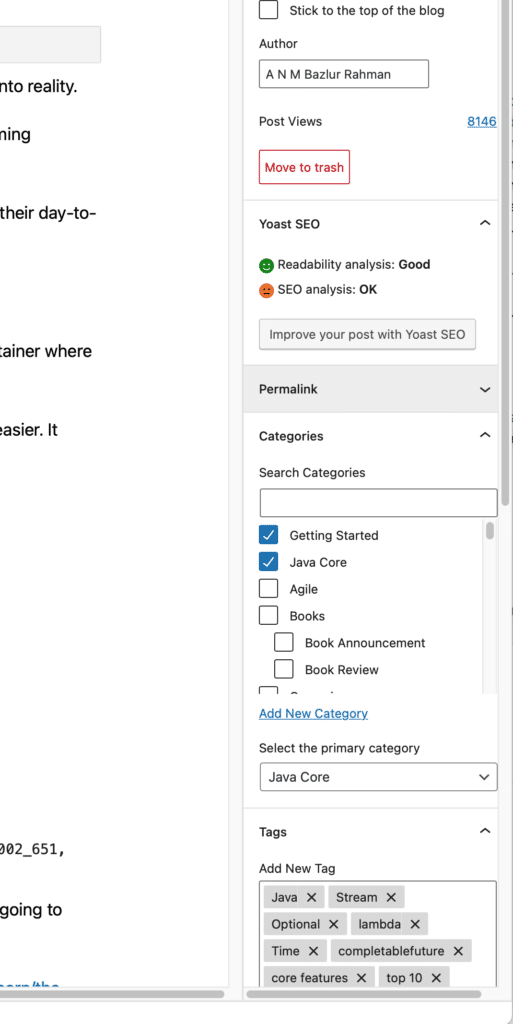
Search Engine Optimization
Use these steps to make sure your article is indexed correctly for search engines.
- Scroll down to the section "Yoast SEO" and add the title and a (optional) short description, as shown below.
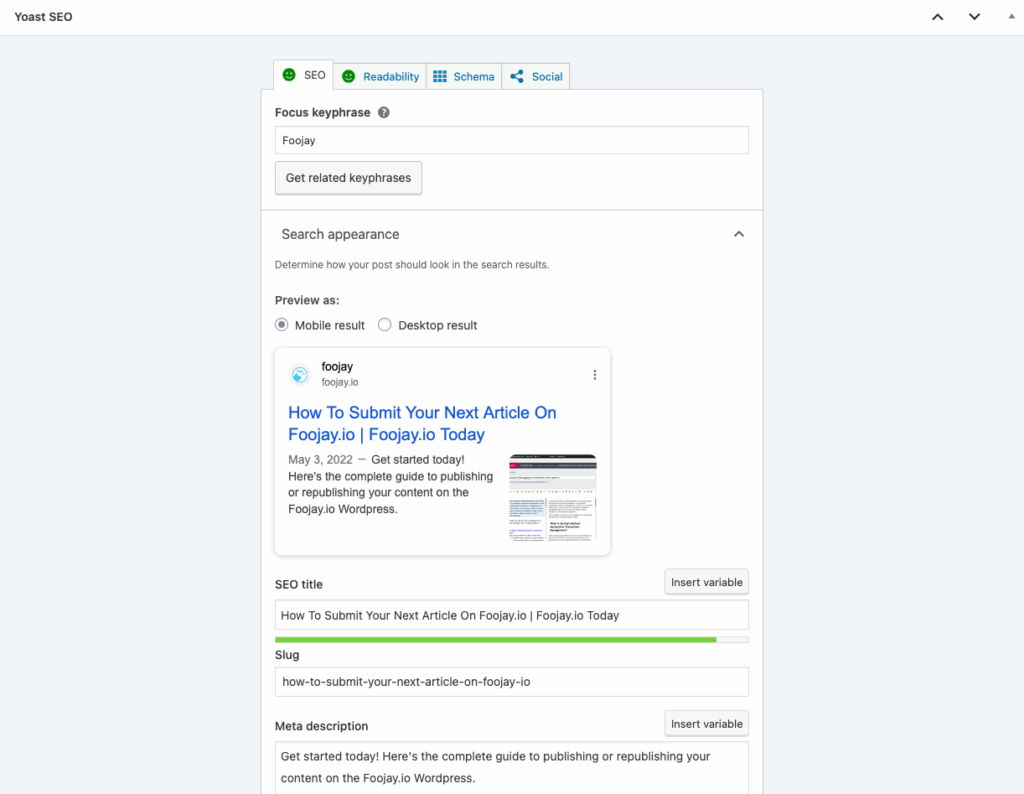
- Is this a cross-post of an article that was already published on another website earlier? Make sure to add a canonical link. It will tell search engines where to find the original article. You can also find this at the bottom of the editor page, in the "Yoast SEO" section > Advanced > Canonical URL. Fill in the full URL to the original article in this field.
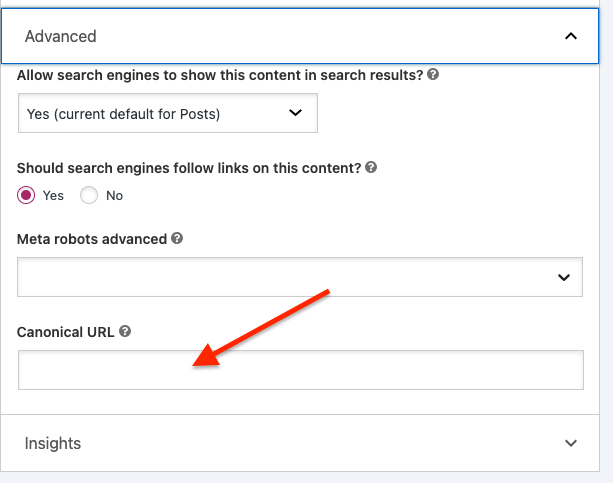
Tips & Tricks
Don’t Forget to Share This Post!





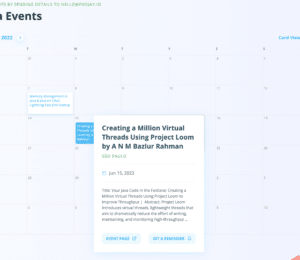

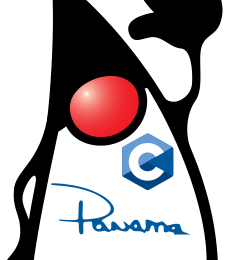
Comments (0)
No comments yet. Be the first.